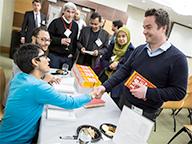Faculty News
—
Prof. Nicholas Economides is interviewed on Greece's Syriza party and its plans for the economy
—

Excerpt from Fortune -- "If its creditor nations agreed to extend the maturities to 75 years, Greece could easily handle its current debt load. It might be enough for Syriza to withdraw its pledge to roll back previous reforms and to honor its debts in exchange for those longer maturities. 'I think they will make a u-turn,' says Economides. 'The money they need is so gigantic. They will not have a choice.'"
Faculty News
—

Excerpt from Fortune -- "If its creditor nations agreed to extend the maturities to 75 years, Greece could easily handle its current debt load. It might be enough for Syriza to withdraw its pledge to roll back previous reforms and to honor its debts in exchange for those longer maturities. 'I think they will make a u-turn,' says Economides. 'The money they need is so gigantic. They will not have a choice.'"




















